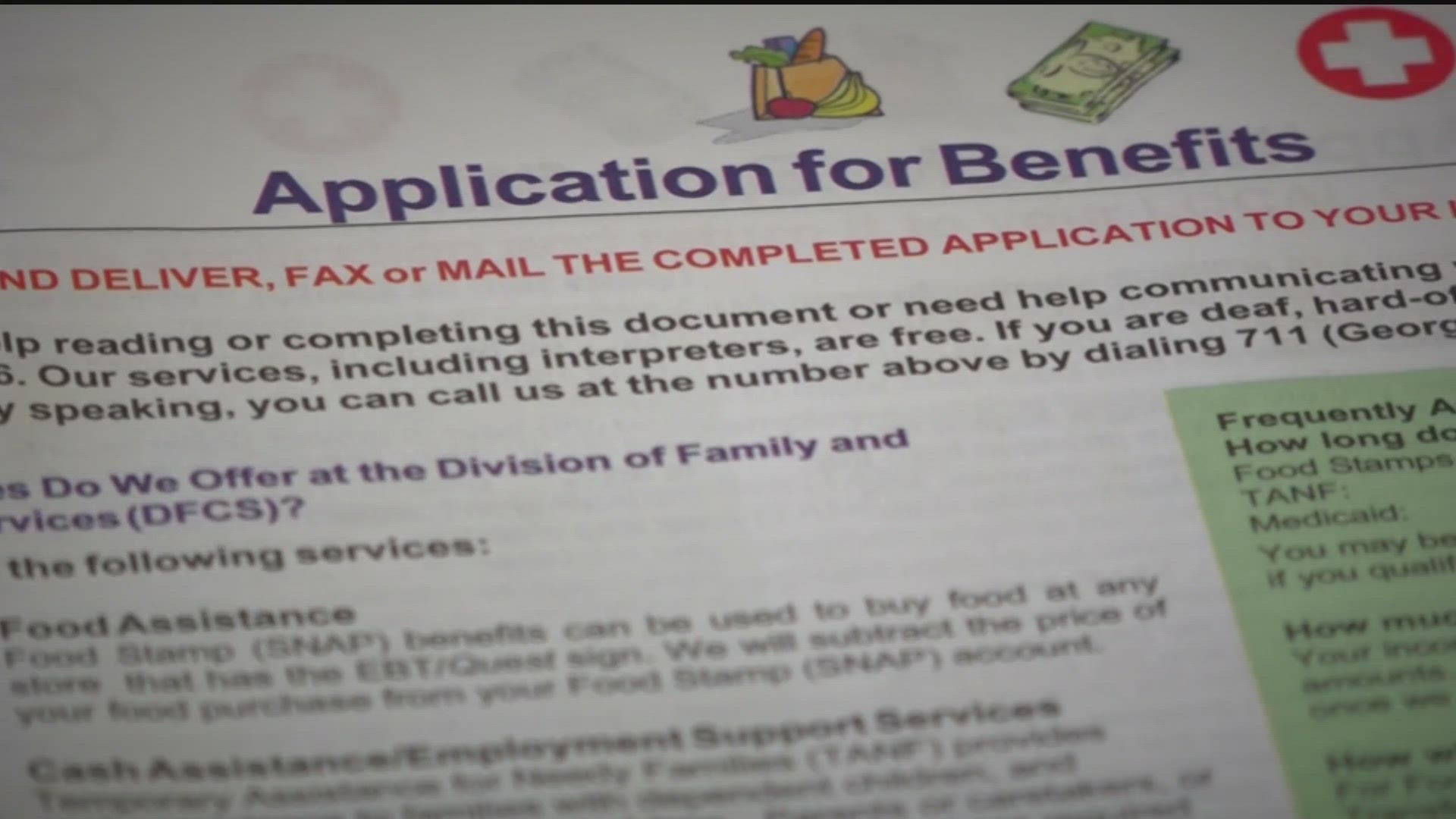STONE MOUNTAIN, Ga. — Three months since federal regulators demanded Georgia develop a plan to fix “unacceptable” SNAP benefit delays, 11Alive has learned that the plan still has not been approved.
Meanwhile, the state continues to deal with a backlog of tens of thousands of cases, impacting families like Stone Mountain resident and mom Angela Davis.
“I’ve called the caseworker on numerous occasions,” Davis said. “Her mailbox is full. Her supervisor Ms. Martin’s mailbox is full.”
Davis lost her job, so she applied for SNAP benefits in order to provide for her daughter and herself in the interim. But like others 11Alive has spoken with over the past year, she struggled to reach her caseworker and get clarification about pending paperwork. Davis, like other Georgians, turned to community resources while waiting for the food benefits for which she was eligible.
“In the meantime, we're going to food pantries,” Davis said.
Federal law requires SNAP benefits to be issued to eligible families within 30 days for the majority of cases and seven days for expedited cases. The U.S. Department of Agriculture, which oversees the federal program, also checks to make sure states are processing new cases on time, using what’s known as the ‘Application Processing Timeliness' (APT) rate as a quality benchmark.
In November, federal regulators issued a letter to Georgia Department of Human Services Commissioner Candice Broce following the state’s declining APT rate, writing, “Georgia is severely out of compliance with Federal requirements.” An APT rate of 95 percent and above is considered acceptable, and Georgia's rate, the letter stated, has been "concerning for some time.”
As a result, Georgia DHS was required to submit a corrective action plan defining the reasons the state is experiencing delays with new applications. That plan also had to include strategies and a timeline for Georgia to get back in compliance with federal standards.
11Alive reported on the initial draft submitted to the USDA in December. But a spokesperson for Georgia DHS confirms the state is still making required revisions three months later. The most recent copy of the plan shows Georgia’s APT rate at 69.75% as of Dec. 31. The document also shows how the department’s efforts to dig out of a backlog of renewal cases over the past year subsequently impacted new applications. Georgia DHS leaders moved nearly 200 veteran staff members from completing applications to completing renewals.
“Because of that move, Applications Processing Timeliness has gone below 95%,” the plan states while laying out the department's strategy for transferring staff back to their original roles once the renewal backlog decreases.
The number of overdue cases can be a moving target as more families either apply for benefits for the first time or additional cases come up for recertification. But as of Feb. 21, a DHS spokesperson told 11Alive the state has 5,962 renewals overdue and 46,000 new applications overdue.
Other challenges impacting new applications include hiring, staff training and incorrect data reports. Per the action plan, staff are unable to depend on the daily report that’s designed to show pending application progress. The data, per the plan, is “inconsistent as cases disappear and re-appear on the reports, and these cases must be researched to determine their validity.”
While DHS did not answer 11Alive’s questions about how long that particular report has been problematic, a spokesperson responded that Gateway “is a complex system that is enhanced and refined on a regular basis.”
The spokesperson added that the department collaborates with its vendor "on fixes for reporting issues and other improvements."
Going forward, federal regulators still must sign off on Georgia’s corrective action plan, but the document details that the state plans to continue using strategies like overtime and stipends to address delays while also employing BOTs to help schedule interviews. The department also recently implemented the USDA’s recommendation to extend renewal certification periods from every six months to every twelve months, an option that’s been available to states to help manage workload.
As families like Davis continue to ask for help, 11Alive continues to ask for an interview with Commissioner Broce. To date, that request has not been granted.
“It makes you feel like your needs are not important,” Davis told 11Alive. “The people suffering right now because of the price of living are at the bottom of the priority list.”
Once the CAP is approved, the federal government requires states to improve APT rates by a minimum of five percentage points every six months. Georgia DHS aligned several of its completion dates with that minimum timeline, which would be December 2026.
When asked about that timeline, a DHS spokesperson tells 11Alive that date “is not an estimated date for when the backlog of SNAP cases will be resolved.”
Georgia Department of Human Services’ efforts to deal with the backlog also include:
- Ensuring caseworker dashboards focus their attention on the oldest renewals first;
- Working with Georgia Tech industrial engineers to examine our task-routing process and subsequently implement a new task-routing system that removes manual work and empowers supervisors on the ground to prioritize work for their teams more efficiently.
- Bringing back retired caseworkers to help process renewals and
- Hiring new Economic Support Specialist 1 workers (over 1,200 since January 2023).
11Alive now has a running list of resources for families experiencing SNAP disruptions. Viewers who want to speak with a reporter about the delays can email the newsroom.

